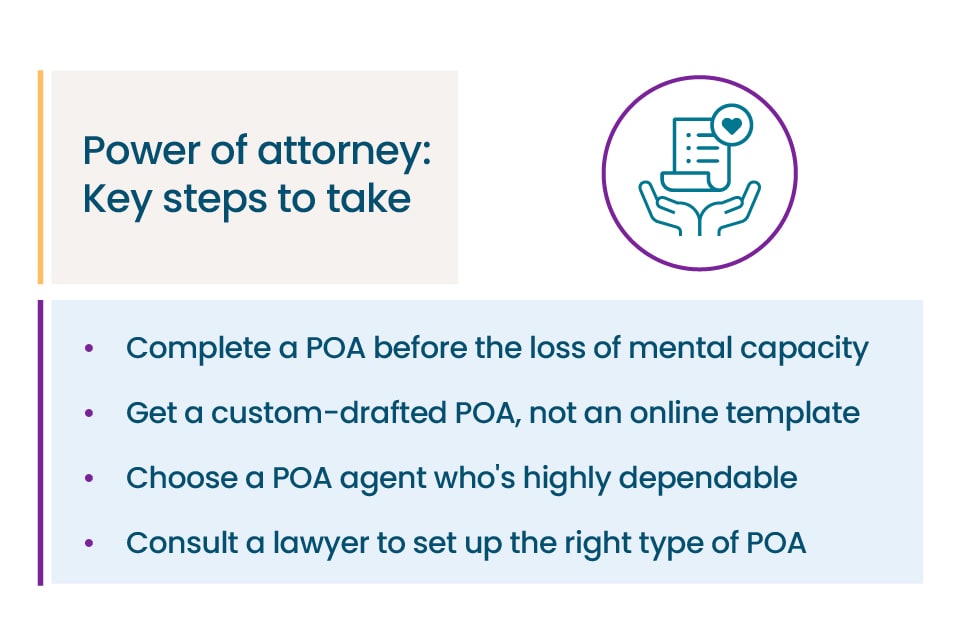
The Top Misconceptions About a Power of Attorney

A power of attorney (POA) is a useful legal tool for seniors and families planning for the future. At its basic level, a power of attorney gives one or more persons the power to act on another’s behalf. And there are numerous circumstances in which a power of attorney can be used, from financial decisions to those concerning medical care. But there are also several misconceptions associated with creating a power of attorney and the powers it grants. Experts recommended families seek the aid of a lawyer to draft a power of attorney that meets their loved one’s unique needs and minimizes mistakes that can lead to legal pitfalls.
Let our care assessment guide you
Our free tool provides options, advice, and next steps based on your unique situation.
Key Takeaways
- A power of attorney allows a person to make decisions on behalf of another. The principal grants power to an agent to make decisions for them.
- If the principal is mentally incompetent when a power of attorney is signed, it may be invalid. An invalid power of attorney may void directives contained in the document.
- Avoid using power of attorney documents found on the internet. These documents may not address state specific laws or your loved one’s individual needs.
- There are several types of power of attorney documents. A lawyer can help you choose the document that best fits your family’s circumstances.
What is a power of attorney?
A power of attorney (POA) gives one or more persons the power to act on behalf of another person. The primary parties in a power of attorney are the principal and the agent. A principal is the person for whom the decisions will be made. The agent, or the attorney-in-fact, is the person appointed to act on the principal’s behalf.[01]
A power of attorney should be created for specific financial or medical decisions that need to be made on behalf of the principal, says Stuart Furman, an elder law attorney and author of The ElderCare Ready Book.
Misconception #1: A mentally incapacitated individual can appoint a power of attorney
This is one of the most common misconceptions about the power of attorney, according to Furman. An individual cannot appoint a power of attorney, or sign legal documents if they are mentally incapacitated. A person who is legally incapacitated lacks the physical or mental abilities to manage his or her own personal care, property, or finances.[02] Capacity will be judged by the attorney who prepares and works with the principal to execute the power of attorney.
Furman provides the following example in The ElderCare Ready Book, “Once your parent lacks competence they can no longer sign any legal documents, including a power of attorney or living trust, which was intended to be used if they became incompetent.”[03]
Misconception #2: You should use power of attorney documents from the internet
By choosing to use a power of attorney document found online may be missing important information that could invalidate the power of attorney. A power of attorney document should be created with intention to address the specific circumstances and needs of the principal.
Families can be confident that an attorney drafted power of attorney will include the following:
- Legal requirements specific to their state
- Tailored details appropriate to their situation
- Specific instructions
- Legal authority
“If a power of attorney is ambiguous, it is ripe for challenges and interpretations,” Furman say. “Estate-planning documents are the most important documents a person will ever sign. They should not be bought on the cheap from an untrusted source.” In addition, if a principal lacks capacity and they sign a power of attorney, the power of attorney would be voidable.

Let our care assessment guide you
Our free tool provides options, advice, and next steps based on your unique situation.
Misconception #3: A power of attorney grants an agent the right to do what they please with your estate
By law, an agent has an obligation to make financial decisions that are in the best interest of the principal. A power of attorney doesn’t grant full financial rights to a principal’s assets. “If the action is not in the best interest of the principal then, despite having the power to act, you do not have the right to act,” says Furman. The agent does not have a right to use the principal’s assets for their own benefit without authorization.
It’s important to consider who you choose to appoint as your agent in a power of attorney. You should choose someone who is trustworthy, dependable and has integrity — especially if their authority will extend after you are incapacitated.
Misconception #4: There is only one standard power of attorney
There are several types of powers of attorney to help accommodate the specific circumstances of the principal.
The most common power of attorney types include the following:
- General powers of attorney terminate if the principal dies or becomes incapacitated. The rules governing a regular or general power of attorney vary from state to state. However, an agent’s powers should be explicitly detailed in the document.
- Limited or special powers of attorney limit the agent’s authority to only the powers that are written into the document. It’s the responsibility of the agent to thoroughly understand the power of attorney document and the authorities they are granted regarding the principal’s affairs.
- A health care advance directive (HCAD) is a power of attorney that allows an agent to manage health decisions should the principal become incapacitated.
- A durable power of attorney allows the agent to continue to act on the principal’s behalf, even if the principal is mentally incompetent. This authority is often granted to an agent who can manage financial end-of-life decisions.
There are two types of durable powers of attorney:
- A currently effective durable power of attorney becomes effective when it is signed by the principal and continues even after the principal becomes incapacitated.
- The springing durable power of attorney becomes effective when a predetermined event occurs, such as incapacity, as outlined in the document.
The authority granted to an agent under the power of attorney terminates once the principal has passed away. It should be noted that many powers of attorney, with the exception of the durable POA, also terminate when the principal becomes incapacitated.

Talk with a Senior Living Advisor
Our advisors help 300,000 families each year find the right senior care for their loved ones.

Support for families seeking legal assistance
A power of attorney is one of many legal tools families can use to help them plan for the care of a loved one. However, choosing the correct documents and navigating the various local, state, and federal laws can be overwhelming. For this reason, seeking the support of an elder law attorney can be helpful when choosing to create a power of attorney. The National Academy of Elder Law Attorneys search tool can help you find an elder law attorney in your area.
Key Takeaways
American Bar Association. Power of attorney.
Wex Legal Dictionary and Encyclopedia. Incapacity. Cornell Law School Legal Information Institute.
Furman, S. (2015). The eldercare ready book. Wheatmark.
Senior living options in all states
The information contained on this page is for informational purposes only and is not intended to constitute medical, legal or financial advice or create a professional relationship between A Place for Mom and the reader. Always seek the advice of your health care provider, attorney or financial advisor with respect to any particular matter, and do not act or refrain from acting on the basis of anything you have read on this site. Links to third-party websites are only for the convenience of the reader; A Place for Mom does not endorse the contents of the third-party sites.
Make the best senior care decision
Make the best senior care decision